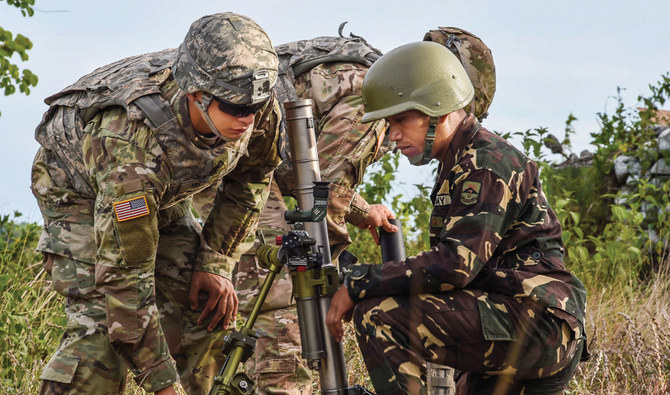MANILA: More than 7,000 Filipino and American forces began their 35th joint military exercises on Monday as militants linked to Daesh continue to threaten the stability of the southern Mindanao islands.
Armed Forces of the Philippines (AFP) chief Gen. Benjamin Madrigal Jr. said the Balikatan (which translates as shoulder to shoulder) exercise this year will focus on territorial defense and counterterrorism.
The AFP, aided by US forces, crushed a Daesh-linked force that took over the city of Marawi in Mindanao in 2017.
Similar groups claimed the bombing of a church on the island of Jolo, south of Mindanao, which killed 23 worshippers in January.
Although 900 Daesh fighters, from the Philippines and elsewhere, were killed in Marawi, significant numbers are believed to be active in the Mindanao islands.
“Balikatan 2019 aims to enhance the interoperability of the Philippines and the United States forces in joint and combined operations, and to project a posture of readiness to combat any security threat,” Madrigal said during the inaugural ceremony held at Camp Gen. Emilio Aguinaldo.
Balikatan, the biggest war games involving US and Philippine troops, is a platform for the two countries to exchange best practices in military operations.
“(It’s) a venue where we could validate our defense plans, and an opportunity where we could amplify our alliances with other participating countries,” Madrigal said.
“All of us understand how threats on security constantly evolve, including the non-traditional security challenges at present. As we have this year’s Balikatan, we will shoulder the load together to prepare for these scenarios, and should a crisis or national disaster occur in the future, we’ll be ready.”
US Marine Corps Brig. Gen. Christopher McPhillips, the US exercise director for the annual military maneuvers, described Balikatan as one of the premier military training events in the Pacific, which has helped both militaries maintain regional stability, uphold international norms, combat violent extremism and alleviate human suffering.
He also said the US Marines are committed to standing shoulder to shoulder with their Filipino brothers and sisters “under any circumstances as true friends.”
US Ambassador Sung Kim said the importance of Balikatan extends far beyond the military interoperability of the two countries.
“It links us together on a personal level, fortifying friendships and better camaraderie from the lowest levels up to the leadership ranks,” Kim said. “The relationships, skills and cooperation that our nations build here will have significant implications for the safety and security of the Philippines and the whole Indo-Pacific region.”
The US envoy said he was shocked by the devastation of Marawi when he visited last year. “It was difficult to comprehend, but I was equally impressed to learn more about how our two militaries cooperated to defeat the insurgents and reclaim the city,” he said.
Marawi City was seized in 2017 by members of a local Islamist group that had pledged allegiance to and had been supported by Daesh in Iraq and Syria.
The group was defeated by government forces with US support after five months of heavy fighting that left the city destroyed.
“Our success in Marawi is an important reminder of how the training, relationships and shared experiences forged during exercises like Balikatan enabled us to defeat security threats and save lives,” said Kim.
More than 4,000 Filipino and 3,500 American troops will participate in this year’s Balikatan, which will include live-fire training, urban operations training, aviation operations, bilateral planning, and humanitarian and civic assistance projects.
Fifty members of the Australian Defense Force will participate in the special operations segment of the exercise.
This will also be the first Balikatan exercise to incorporate the US Navy’s amphibious assault ship USS Wasp and the US Marine Corps’ F-35B Lightning II aircraft.
“Participating in Balikatan demonstrates their ability to quickly forward deploy in support of an ally should a crisis or natural disaster occur,” said the US Navy.
Balikatan 2019 will also bring together representatives from Japan, Canada, New Zealand, South Korea, Thailand, Vietnam and the UK for an International Observers Program.
The program aims to promote greater defense cooperation with the Association of Southeast Asian Nations (ASEAN) and other key allies and partners, show multinational coordination where the observers can exchange ideas and best practices, and showcase the joint air, sea and ground operation of the Philippine-US armed forces.
Security expert Resty Aguilar said interoperability, as used in the exercise, is from the viewpoint of the armed forces of two different countries.
“It means they understand a common language, and at least a common interpretation of a certain tactic or strategy,” he told Arab News, adding that the exercises are important in preparation for natural catastrophes as well as combat.
In 2013, the US was one of the first countries to respond to the Philippines after super typhoon Yolanda wrought widespread destruction across the Visayas archipelago, killing more than 6,000 people.
“On the part of the Americans, their biggest take away is they learn a lot from their Filipino counterparts’ combat and non-combat experiences that are obtained in our own situation,” said Aguilar.
“Many of these are experiences that aren’t yet written in their reference materials or manuals, like the insurgency problems in the Philippines; they don’t have that in the US,” he added.
“They (the Americans) saw similarities in the insurgency in Iraq and Afghanistan. They only started reviewing our experiences when they were already fighting the insurgencies in Afghanistan and Iraq. It’s safe to say also that what they learned from us through these exercises somehow helped them in their operations in the Middle East.”
















